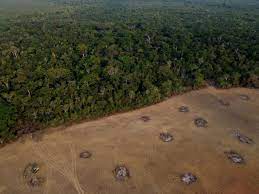Following on from my last post, we are trying to deal with the problems which have been pushing the website offline – it is in hand, but for now the website is still fragile. When all is sorted, we will go back to trying to move forwards with fulfilling the aims of this website. For now, as much as possible I am able to post some entries.
For a long time, governments in the west have injected bonds into the market in order to get it going in times when it is struggling. Between the Covid epidemic and various other issues there are far more countries that are trying to do this.

Unfortunately it is proving hard to do this without directly financing deforestation, in places like the Brazilian Amazon, where agri-business giants have used it to finance their projects – many without any legal clearance.
So far, investigations have shown that millions of dollars of bonds have been bought from companies engaged in exactly this behaviour (which in normal times, these same banks would be trying to avoid helping). The bank of England, the US Federal Reserve and the European Central Bank have all been linked to this dangerous behaviour. Because these loans are underwritten by the government in each case, it means that the British, US and EU member states have all directly supported deforestation and land grabs.
There are 3 large Brazilian companies linked to this, including Cargill, Inc., the Archer-Daniels-Midland Company and Bunge Ltd Financial Corps. Each have defended themselves, however with national governments pumping money in, it is likely that the due diligence is lower than would normally be carried out.
Importantly, all three of these central banks have repeatedly denied that they are behaving in this way. However, both the UK and EU banks refused to disclose the size of their holdings in these companies – a distinct lack of honesty in democracies, and a worrying turn. It either suggests that the banks are hiding how large their support was, or perhaps more worryingly, they see these loans as good investments and wish to use them again.
26% of the Amazon is gone. Furthermore, there are large areas which have had their delicate balance upset – thereby making a collapse more likely and the idea that large parts of the Amazon might hit it tipping point and turn to Savannah is becoming an increasingly close threat.
With Jair Bolsonaro having been voted out of office, hopefully the damage will be reversed, but it shows how delicate areas like the remaining rainforest continue to be.
